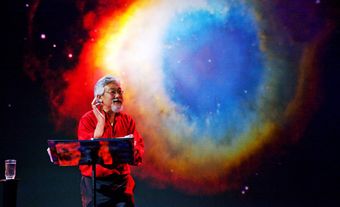This article was originally published in Maclean’s magazine on October 4, 2004. Partner content is not updated.
David Suzuki was there to explain to Canadians the grand ambitions of the early space program and our Anik satellites.David Suzuki was there to explain to Canadians the grand ambitions of the early space program and our Anik satellites. He helped us understand the first test-tube baby and advancing technology. Nuclear energy, genetic engineering, global warming - Suzuki walked us through it all. Marking 25 years as host of the CBC's The Nature of Things this season, the 68-year-old geneticist is Canada's best-known science journalist and advocate for the environment. But his biggest discovery has been the power - and the limitations - of TV.
You were a university professor. How did you end up on national television?
I was this young hotshot scientist, going to make my mark. I did some community TV and people would ask me to comment on science. About 1968 I proposed a science show to the CBC. By then I was a hippie, had long hair, a headband, granny glasses, and I wore these flamboyant shirts and bell-bottoms. The scientific community was outraged.
So you've actually been on TV much longer. How has the experience changed?
Well, I started with the very great conceit that if you do good programs you'll have big influence. I'm a helluva lot older and a bit wiser now. I'm not going to make any difference. I've become a part of the electronic media that's overwhelming people with bits of information. What worries me is I've been a part of the shattering of the world.
What keeps you awake at night these days?
It's that people just do not see or hear what scientists are telling them. I just watched all this stuff on the health summit, and it makes me sick. These guys act as if medical costs are just going to continue to climb. Nobody is saying, Our country is not healthy, we've got to reduce the need for medical care. We think the economy is everything, and we don't see that it - like health, like everything else - depends on the health of the planet.
If we change nothing about our behaviour, how much longer do you give us, as a species?
I don't think anyone can say. During the 1990s, the Worldwatch Institute said that if we don't turn it around in the next 10 years, we're hooped. And so a lot of us went running around saying, "This is the turnaround decade!" The Earth has been far more generous than anybody expected. But we have concrete evidence that we are hitting walls. Look at this cycle of hurricanes now. That's astonishing - another warning that climate change is kicking in. Jesus Christ, what does it take?
What do you make of this complacency?
It's terrifying. We're going right down the chute, but I don't think anyone can say it's too late. The role model for me is Nelson Mandela. If he could stay in jail all those years and have hope, nobody's got the right to say it's too late.
Maclean's October 4, 2004

 Share on Facebook
Share on Facebook Share on X
Share on X Share by Email
Share by Email Share on Google Classroom
Share on Google Classroom

